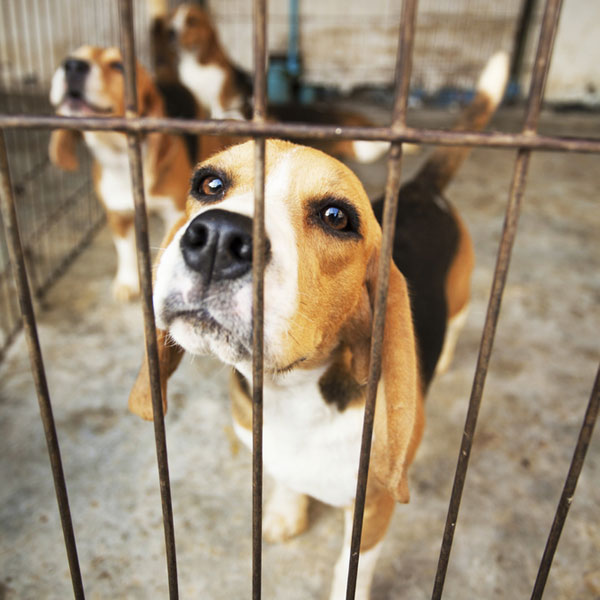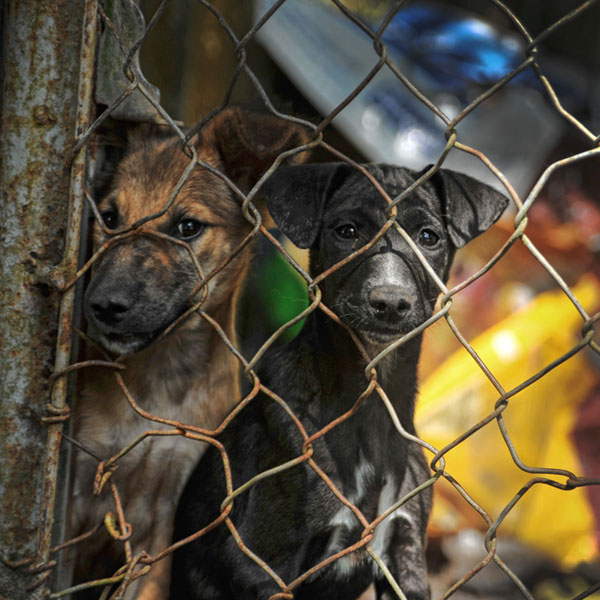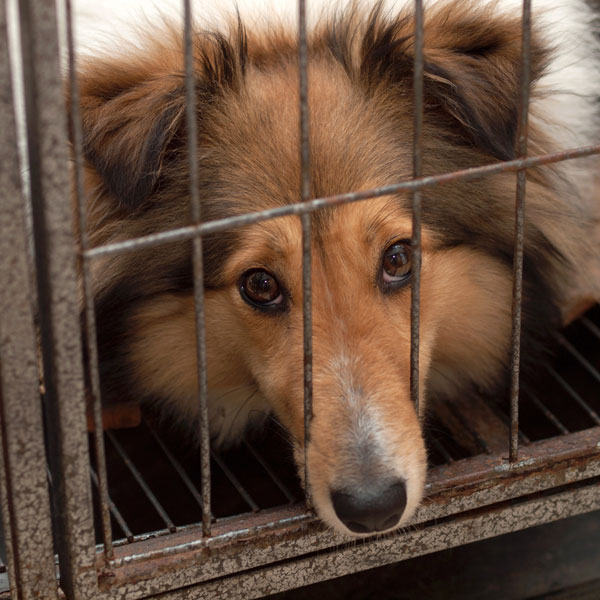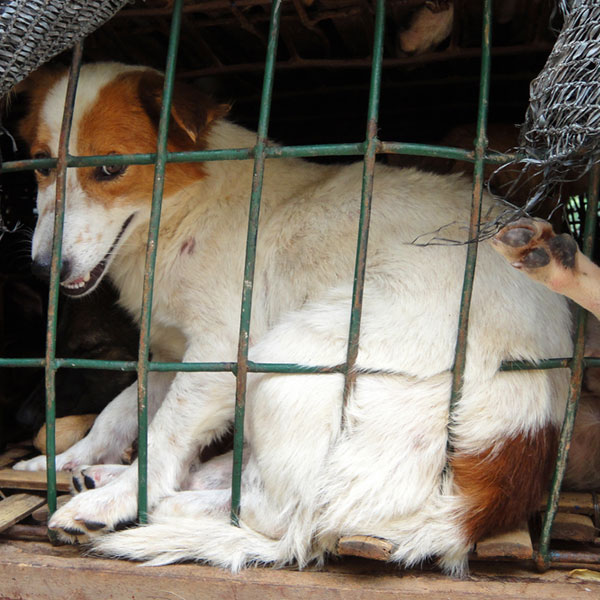Look at your dog. Now imagine your dog in a chicken-wire cage in which she cannot comfortably move around, much less walk or run. The wires that crisscross the floor of the cage are caked in urine and feces. Your dog is not getting enough water or food, and she is made to breed every time she is in heat. Picture that cage stacked atop and next to 50 others or more. I can’t look at my dog and think these thoughts for more than a few seconds without feeling sick.
This, and much worse, is the life led by dogs in untold thousands of puppy mills. The number of active puppy mills in the United States alone is unknown; depending on the source, estimates range from 4,000 to 15,000. The Humane Society of the United States and the American Society for the Prevention of Cruelty to Animals put the number around 10,000. Let’s not mince words; puppy mills are the worst. Regardless of whether they break the law, to us they’re animal cruelty, plain and simple.
What is a puppy mill?
A puppy mill, basically, is a Dickensian factory for the production of puppies, which largely make up the population of puppies for sale in pet stores. These puppies are also increasingly sold online to unsuspecting buyers looking for purebred or designer dogs. The sole focus and purpose of a puppy mill is profit. Female dogs go into heat every six to eight months, meaning that they are capable of bearing a litter of puppies twice a year or three times every 18 months. Puppy mills focus on quantity over quality at every turn and in every respect.
Lack of focus on quality means that dogs in puppy mills do not receive adequate, if any, veterinary attention. The crowding of so many dogs into puppy mill venues makes them hotbeds for infectious diseases and psychological traumas for the dogs immediately involved.
The puppies that are born in puppy mills are subject not only to increased risk of congenital disorders but are also exposed to viral and bacterial diseases that can be transmitted during birth. Puppies are taken from their mothers, often well before they reach six weeks old, and sold as purebred, pedigreed dogs through newspaper ads, websites, and in pet stores.
Kept inside, where afflictions like kennel cough and parvovirus spread without check, or outside, where no thought is given to protecting them from adverse weather conditions, puppy mills offer dogs nothing in the way of comfort or care. Dogs are not permitted to play, exercise, or socialize. As you might imagine, the lives of puppy mill dogs are, as Thomas Hobbes might say, “solitary, poor, nasty, brutish, and short.” Female dogs are bred as frequently as possible, with increasingly smaller litters until they are no longer viable, at which point they are simply discarded to make room for others. To those who love and care for dogs, a puppy mill is nothing short of a horror and an abomination.
Are puppy mills illegal?
The people who run puppy mills do so to take advantage of a lucrative market that allows them to function largely without regulation or restrictions. While the United States Department of Agriculture and the Animal Welfare Act of 1966 mandate standards of care for licensed breeders and employ inspectors to ensure those standards are met, puppy mills have not traditionally been held accountable. In spite of the terrible, inhumane treatment that dogs are subject to in puppy mills, they are not illegal as such.
It is only really since 2008 that local, city, and state legislatures have started to take positive action to curb puppy mills. States like Louisiana, Oregon, Virginia, and Washington have placed limits on the number of dogs that can be kept by a single breeder, but less than half of the 50 states even have established regulations on the age of puppies that can be sold commercially. Of course, with limited resources and personnel, even recent legislation can be difficult to enforce when so many puppy mills operate under the radar.
Cities like Los Angeles and Phoenix have taken steps to hurt puppy mill operators in the place that matters most, to wit, their pocketbooks. These cities have enacted legislation banning the sale of puppies from commercial breeders in pet stores and insisting that puppies that are sold in these places come from shelters and rescues. Los Angeles’s move came in 2012, Phoenix’s in 2013, meaning that these steps, big though they are, are still in their infancy.
In 2013, the USDA announced that new rules were being put in place to force online puppy retailers to be licensed in hopes of further curtailing the Internet puppy trade. That this was a result of a report filed in 2010 shows, unfortunately, how slow the process of stopping puppy mills has been.
How to stop puppy mills
We hear regularly of dogs and puppies being rescued in raids on puppy mills. Since many puppy mills operate in seclusion and anonymity, and since resources and personnel are limited when it comes to enforcing restrictions that are in place, the end of puppy mills is not yet in sight. There are several things concerned people can do.
Adopt dogs from local shelters and rescues. If you do get a puppy from a breeder, make sure they are local, licensed, reputable, and that you can visit and see their facilities. Write to local and national elected representatives to advocate for more direct and powerful legislation. Report puppy mills to the Humane Society or inform law enforcement officials. With further concerted efforts and heightened awareness, hopefully the cruelty, barbarity, and neglect can one day come to an end.
Read the most talked about news on Dogster:
- A New York Shelter Braces for a Wave of Discarded Dogs Who Were Christmas Presents
- Shelter Worker Who Dumped Dog in Dumpster Is Charged
Featured Image Credit: Sigma_S, Shutterstock
















